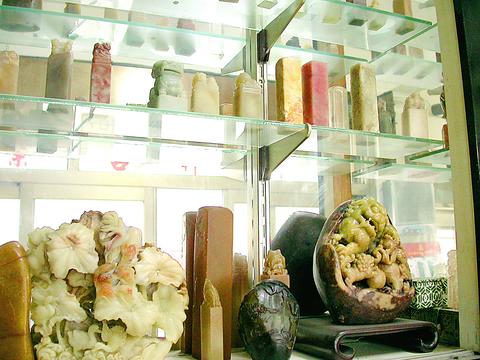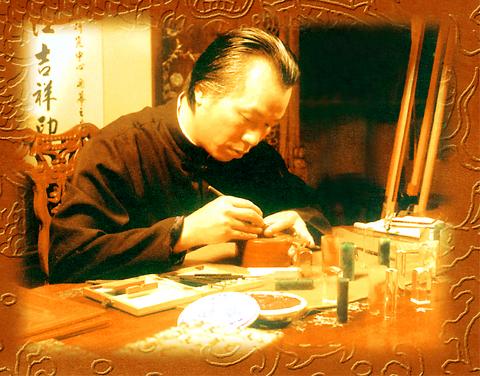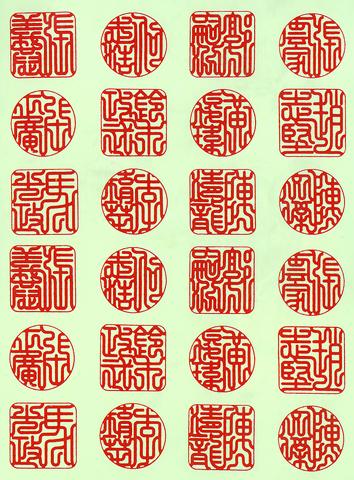You can have them cut for NT$50 at street-corner stalls or get them elegantly carved in jade or other semi-precious stones. Seals are still an integral part of Taiwanese life, but their significance is gradually changing as signatures gradually replace the seal as a means of confirming a transaction.
For Lonmen Lucky Stamp (

In a time of economic downturn, those who take seals seriously are primarily interested in their ability to bring good fortune. And this isn't something for uneducated country bumpkins either.

PHOTO: VICO LEE, TAIPEI TIMES
The majority of its customers are not, as you might expect, tradition-minded country folk, but urban business people and government officials of various ranks.
"It seems that the more educated and better-off people are, the more they care about their fortunes," said Chen Tian-zang (

PHOTO COURTESY OF LONMEN LUCKY STAMP
And in these times of economic gloom, people care more than ever. Despite the prevalent cries of poverty, Lonmen has no difficulty in disposing of a pair of rectangular and cylindrical jade seals for NT$36,000. At Lonmen, even the most common type of lucky seals are priced between NT$1,500 and NT$5,000 a piece.

While the average seal maker cuts maybe a couple of seals a day, Yang Feng-yin (
Lonmen started 10 years ago in Taichung, working only through mail order. It has now fanned out into 20 branches in shopping malls in Taiwan's major cities. Five to 10 more branches are scheduled to open in Taipei alone.
It all started with a promotional activity at Taichung's Far East Department store six years ago, when Lonmen staff -- all trained in the art of fortune-telling -- were asked to provide astrology sessions as prizes for shoppers. Over the ten-day promotion, Lonmen grossed more than a NT$1 million. From then on, Chen decided that setting up in swank department stores and malls was the way to go.
"Big malls are the place to be. Individual workshops are going downhill. Malls are where crowds gather and where we can reach out to the largest possible public," Chen said.
The seal company's success story has attracted the attention of both the Chinese media and business analysts, who wonder how Lonmen had managed to bring in over NT$100 million a year in revenues from what is perceived as a very unfashionable industry.
Other peolpe's luck
It all has to do with luck -- other people's luck. Yang, the creative spirit behind the enterprise, started thinking about "lucky seals" as an alternative to "aesthetic seals" back in the 1980s.
"It's hard to achieve the artistic mastery of our ancestors. In ancient days, a craftsman did nothing but carve seals all his life, but nowadays we have too many distractions," said Yang.
He felt that lucky seals would have a much bigger market. "Artistic seals are hard to sell. Few people know how to appreciate them nowadays. But everyone needs good luck. They all have some use for seals which can bring good luck."
The encounter between Chen and Yang 10 years ago changed both their lives. Then a real estate dealer, Chen had Yang make a lucky seal for him. Yang's theory about the close connection between a seal and the fate of its master touched Chen so deeply that he decided to join in a project, broached by Yang and his friend Tzai Ruei-min (蔡瑞銘, present chairman of the company board), to establish a seal-making company.
Drawing inspiration from his former job, Chen said, "People pay great attention to the house they live in. They care about all aspects of the building when house-hunting -- the materials used, its convenience, structure and fengshui. The same level of care should be taken over the house their name lives in -- their personal seal. As everyone has a name and needs a seal, the market is unlimited," Chen said.
Chen, who owns eight pairs of seals, is a believer in the power of a piece of jade with his name on it. "There's an ancient saying: `first, fate; second, luck; third, feng-shui; fourth, good deeds; fifth, effort.' There's no one single decisive factor for success. We have to work hard and at the same time look for things that can speed up our success," Chen said.
For a product that has so much to do with a customer's destiny, Chen decided that only people convinced of the seals' powers and versed in the I Ching -- also known as The Book of Changes and the final word in Chinese fortune-telling lore -- are qualified to sell them. Many of Lonmen's sales staff came into the job after discovering the efficacy of Yang's seals.
Chu Wen-ling (
She got herself a job as an accountant at Lonmen and had a pair of lucky seals made by Yang. "Talking with the salespeople was the first time I'd heard someone tell me I could change my own destiny. You know, Chinese tend to resign themselves to their destiny," said Chu, who later became confident of the power of lucky seals. "Maybe, it was also that I wanted to change. I wanted my life to be better. My confidence did its part."
Chu became one of Lonmen's saleswomen after two years as an accountant and shared her story with her customers.
Chen does not see the power of lucky seals as esoteric at all. "We are scientific people. We use the wisdom of our ancestors to make our lives better. It's different from superstition. It's only when you want your life to be better and you believe in it can the seals help you," Chen said.
Scientific theory
Chen's idea has something in common with the recent findings by British psychologist Richard Wiseman.
In an eight-year study, Wiseman found that the most common traits among lucky people is that they always expect themselves to be lucky and they grab the first chance to make the best of their luck.
Teaching people how to resist thoughts of fatalism and actively change their destiny is the main job for the over 50 instructors Lonmen has stationed in Taiwan's major cities for free consultations with its customers.
Equipped with at least a couple of years' training and assisted with computer fortune-telling software, these instructors see the problems of their customers from an astrological and psychological viewpoint.
"The four main topics of these consultations are business -- especially related to the current recession -- marriage, women having a bad time with their mothers-in-law and parents worrying over their kids," Chen said. As demand for psychological consultation rises, "fortune-psychology consultation," Chen said, is the way of the future.
Yu Rong-hsin (余榮信), a proprietor of a major chain of steak houses in the Taichung area, is a five-year customer of Lonmen. When Yu first bought a lucky seal, he was worried about his business in China. He asked advice on many aspects of his home and business life. "My investments have since paid off and my son, a nine-year-old, now plays the guitar quite well. I think the seals did help my family," Yu said "I think people always need something to rely on psychologically."
On the right side of fifty, Yang said he can handle the seal-cutting job on his own and has no need for apprentices until he knows there are "not many days remaining for me on Earth."
"Maybe in generations afterwards, seals will disappear from people's lives. I would like them to remember me as the man who pioneered [lucky seal enterprises]. Maybe they will give me some kind of title, something like `the great general of luck,' a title by which people call their prominent ancestors. Then I would have a place in the history of seals," Yang said.

In the next few months tough decisions will need to be made by the Taiwan People’s Party (TPP) and their pan-blue allies in the Chinese Nationalist Party (KMT). It will reveal just how real their alliance is with actual power at stake. Party founder Ko Wen-je (柯文哲) faced these tough questions, which we explored in part one of this series, “Ko Wen-je, the KMT’s prickly ally,” (Aug. 16, page 12). Ko was open to cooperation, but on his terms. He openly fretted about being “swallowed up” by the KMT, and was keenly aware of the experience of the People’s First Party

Aug. 25 to Aug. 31 Although Mr. Lin (林) had been married to his Japanese wife for a decade, their union was never legally recognized — and even their daughter was officially deemed illegitimate. During the first half of Japanese rule in Taiwan, only marriages between Japanese men and Taiwanese women were valid, unless the Taiwanese husband formally joined a Japanese household. In 1920, Lin took his frustrations directly to the Ministry of Home Affairs: “Since Japan took possession of Taiwan, we have obeyed the government’s directives and committed ourselves to breaking old Qing-era customs. Yet ... our marriages remain unrecognized,

During the Metal Ages, prior to the arrival of the Dutch and Chinese, a great shift took place in indigenous material culture. Glass and agate beads, introduced after 400BC, completely replaced Taiwanese nephrite (jade) as the ornamental materials of choice, anthropologist Liu Jiun-Yu (劉俊昱) of the University of Washington wrote in a 2023 article. He added of the island’s modern indigenous peoples: “They are the descendants of prehistoric Formosans but have no nephrite-using cultures.” Moderns squint at that dynamic era of trade and cultural change through the mutually supporting lenses of later settler-colonialism and imperial power, which treated the indigenous as

Standing on top of a small mountain, Kim Seung-ho gazes out over an expanse of paddy fields glowing in their autumn gold, the ripening grains swaying gently in the wind. In the distance, North Korea stretches beyond the horizon. “It’s so peaceful,” says the director of the DMZ Ecology Research Institute. “Over there, it used to be an artillery range, but since they stopped firing, the nature has become so beautiful.” The land before him is the demilitarized zone, or DMZ, a strip of land that runs across the Korean peninsula, dividing North and South Korea roughly along the 38th parallel north. This